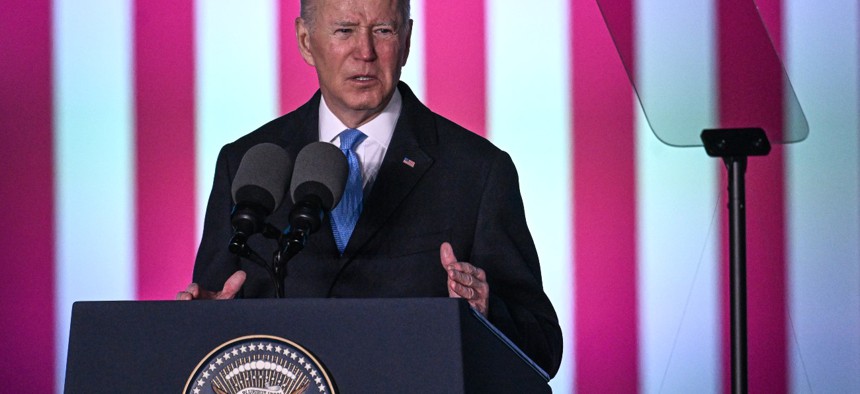
Omar Marques/Getty Images
Biden’s Budget Would Boost Agency Spending by 7.4%, and Advance Equity and Accountability Goals
President Biden sent his $5.8 trillion budget request to Congress on Monday.
On Monday morning President Biden unveiled a $5.8 trillion budget request for fiscal 2023 that would increase base discretionary spending by 7.4% over the level in the recently enacted omnibus bill and expand on his administration's endeavors to make the government “equitable, effective and accountable.”
Biden is proposing a total of $1.6 trillion in base discretionary funding, with an increase of $56.3 billion, or 9.5%, in non-defense discretionary spending from estimated fiscal 2022 levels enacted in the omnibus appropriations package and a boost of $31.2 billion, or 4%, in defense funding.
This year the administration added “VA medical” as its own third category (usually under non-defense) because the administration believes it should be treated separately for practical use as well as to show its value, an administration official told Government Executive on background (that category of spending would increase $21.5 billion, or 22.2%, over estimated fiscal 2022 funding).
“The president’s budget advances the goals of the president’s management agenda across three priority areas: strengthening and empowering the federal workforce; delivering excellent, equitable and secure federal services and customer experience; and managing the business of government to build a better America,” said the budget documents. “This work––including the investments the budget puts forward in support of the [agenda]––is critical for bolstering the federal government’s capacity and capabilities to deliver for the American people today and for years to come.”
The budget also seeks to advance several executive orders and initiatives related to the management agenda, such as on improving government customer service; increasing diversity, equity, inclusion and accessibility in the federal workforce; increasing federal procurement from domestic sources; and ensuring federal employees and contractors make at least $15 per hour. This is all part of the administration’s efforts in “Ensuring an Equitable, Effective, and Accountable Government That Delivers Results for all,” as a section of the budget is titled.
Some of the other priorities outlined in the budget request that would affect the federal workforce and operations are:
- Increase capability of law enforcement agencies, such as the FBI and U.S. Marshals Service, to combat violent crime and ensure that U.S. attorneys have the support they need to prosecute these crimes;
- Make more investments in the Justice Department to bolster prosecution of hate crimes, police reform, enforcement of voting rights and efforts on equal access to justice;
- Give “transformative investments” across the Health and Human Services Department ($81.7 billion over the next five years) for pandemic preparedness;
- Direct $5 billion to the Advanced Research Projects Agency for Health—a new agency Biden seeks to create—which will drive research and innovation on cancer and other diseases;
- Provide more than $18 billion for climate adaptation and resilience programs across the federal government;
- “Significantly” increase funding for the Indian Health Service over time, adding stability and predictability to that agency’s budget;
- As part of voting rights efforts, expand the U.S. Postal Service’s delivery ability in underserved locations and support vote-by-mail efforts; and,
- Continue to collaborate with Congress, inspectors general and the Government Accountability Office on oversight efforts as well as adhering to “accountability and transparency” in implementing the budget.
The president’s fiscal 2023 budget proposal comes just shy of two weeks after he signed the fiscal 2022 appropriations package into law after a series of continuing resolutions for fiscal 2022.
All of the Cabinet departments would receive an increase in discretionary funding as compared to the continuing resolution that was in effect for the beginning of fiscal 2022. However, the president's proposal for the Homeland Security and Transportation departments would actually represent slight cuts compared to their current funding under the recently passed omnibus for fiscal 2022.
“All told, it is a budget that includes historic deficit reduction, historic investments in our security at home and abroad, and an unprecedented commitment to building an economy where everyone has a chance to succeed,” said a statement from Biden.
The investments in the budget “are more than fully paid,” such as through a proposed policy that the wealthiest Americans pay a minimum of 20% tax on all of their income (including unrealized investment income that is not taxed currently), said a fact sheet. “Overall, the budget reduces deficits by more than $1 trillion over the next 10 years and deficits under the budget policies would fall to less than one-third of the 2020 level the president inherited.”
The budget is likely to undergo significant changes as Congress takes it up, but the president’s party is in control of the Senate, by a slim majority, and the House.
“I look forward to working with members of Congress: Democrats, Republicans and Independents to deliver this budget and keep delivering for the American people,” the president said while giving remarks on Monday afternoon, along with Office of Management and Budget Director Shalanda Young. Young will testify on the proposal before the House and Senate Budget committees on Tuesday and Wednesday, respectively.
This article has been updated with President Biden’s comments at 3:45 p.m. and more on agency funding levels at 4:24 p.m.







